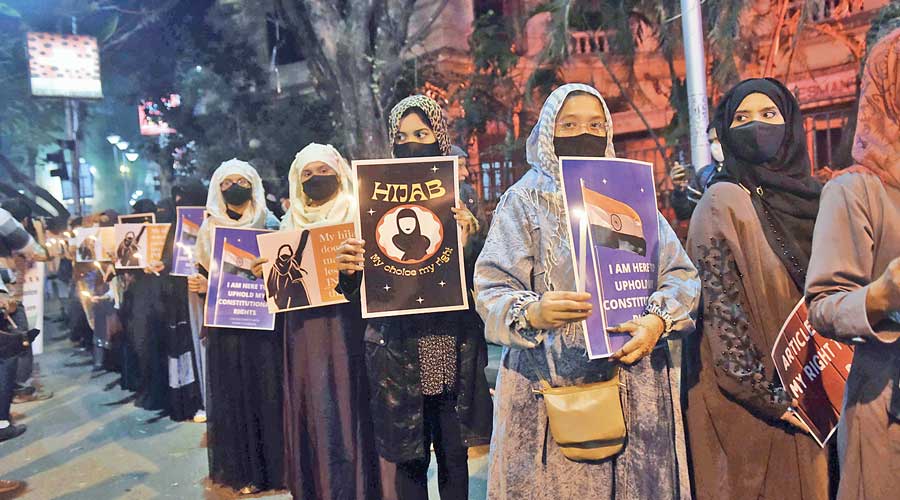Schools in the state forced Muslim students to remove their hijabs in keeping with Karnataka High Court’s interim order against wearing any religious clothing, as classes up to tenth standard reopened on Monday after a short gap since last week’s unrest by Sangh parivar organisations.
Muslim girls wearing hijabs were asked to remove their headscarves before entering campuses across the state. While many students complied with the direction, others returned home without appearing for Class X preparatory exams that are underway.
In its interim order after hearing a petition by a student seeking her right to wear hijab, the division bench of the high court had directed the government to ensure that students did not wear any religious clothing such as hijabs or saffron scarves in classrooms pending disposal of the matter.
The full bench of the high court that heard a batch of petitions challenging the hijab ban in educational institutions will continue the hearing on Tuesday.
Video clips from various schools showed officials asking students to remove their hijabs. In one such video from the Rotary English Medium School in Mandya, around 100km from here, at least three Muslim girls were seen removing their hijabs before entering the campus.
Even adults were not spared, as two women were forced to remove their religious attire before entering the school in Mandya. While it’s not clear if the first woman is a staff or a parent, video shows the abaya-clad woman walking to the gates with a minor girl student. She then stops at the gates and removes her hijab and abaya. Moments later, another abaya-clad woman stops her scooter, removes her hijab and rides into the campus.
The state government had ordered the closure of all educational institutions following last Wednesday’s violent protests by students wearing saffron scarves as a counter to Muslim girls wearing hijabs. Students from both the sides had faced off in several colleges across the state before the government declared holiday for the rest of last week to calm tempers.
The government has enforced prohibitory orders around all schools in Udupi district in coastal Karnataka in view of Monday’s reopening. Udupi MLA Raghupathy Bhat of the BJP told reporters that peace meetings held on Sunday with parents and various organisations helped.
“Everything is peaceful here, as all the 295 schools in Udupi reopened and resumed classes without any glitches. We are ready to reopen colleges tomorrow if the government decides so,” he said.
But there were instances of students refusing to remove their hijabs in some schools in Tumkur and Shimoga.
Deputy director of public instruction in Shimoga M.N. Ramesha said some students refused to write their preparatory exams without their hijabs. “They said they could still write the board exams even if they skipped the preparatory exams,” said the official.
“We have thousands of students writing the preparatory exams. But we cannot do anything if a few refuse to appear for the exams,” he said.
Similar scenes were witnessed outside a school in Tumkur where parents who came to drop their daughters took them back after the school authorities insisted on them removing the hijabs.
The state Assembly that started its budget session on Monday saw Gulbarga North MLA Kaneez Fathima of the Congress turning up in a hijab. “I will continue to wear my hijab even in the House,” she told reporters before entering the Assembly.
Her party had extended support to the rights of Muslim women to wear hijabs in schools and colleges.
The hijab row started at the Government Pre-University College in Udupi where a bunch of Muslim students wearing the headscarves were disallowed entry into classrooms on December 27. The college development committee headed by MLA Bhat refused to budge even though the students and their parents agreed to use the dupatta, which is part of the school uniform, to cover their heads. Eight girls have since been spending time outside the class.
The matter spread like wildfire after a few other colleges in Udupi imposed similar restrictions against Muslim students.











